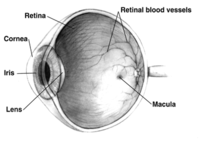
Photo from wikipedia
Background: To determine the retinal capillary function (RCF, the efficiency of blood flow transferring in the capillary network) and its relation to cognitive function in healthy older people without known… Click to show full abstract
Background: To determine the retinal capillary function (RCF, the efficiency of blood flow transferring in the capillary network) and its relation to cognitive function in healthy older people without known cognitive impairment following an 8-week high-speed circuit resistance training program (HSCT). Methods: Eleven subjects in the HSCT group and 7 age-matched nontraining controls (CON) were recruited. The HSCT group trained 3 times per week for 8 weeks, whereas CON performed no formal training. One eye of each subject from both groups was imaged at baseline and 8-week follow-up. Retinal blood flow (RBF) was measured using a retinal function imager, and retinal capillary density (RCD, expressed as fractal dimension Dbox) was measured using optical coherence tomography angiography. RCF was defined as the ratio of RBF to RCD. Cognitive function was assessed during both visits using the NIH Toolbox Fluid Cognition Battery. Results: RCF was 2.07 ± 0.64 nL⋅s−1·Dbox−1 (mean ± SD) at baseline, and significantly increased to 2.59 ± 0.54 nL⋅s−1·Dbox−1 after training (P = 0.0003) in the HSCT group, reflecting an increase of 25%. The changes of RBF were not related to the changes of RCD in the HSCT group (r = −0.18, P = 0.59). There was no significant change of RCF in the CON group (P = 0.58). In the HSCT group, the Pattern Comparison Processing Speed Test and Fluid Cognition Composite Score were significantly increased after HSCT (P = 0.01). Furthermore, the changes in Flanker Inhibitory Control and Attention Test (FLNK) were positively correlated to increases in RCF (r = 0.77, P = 0.005). Conclusions: This is the first prospective study to demonstrate that the increased RCF after HSCT was related to improved cognition in cognitively normal older adults.
Journal Title: Journal of Neuro-Ophthalmology
Year Published: 2022
Link to full text (if available)
Share on Social Media: Sign Up to like & get
recommendations!